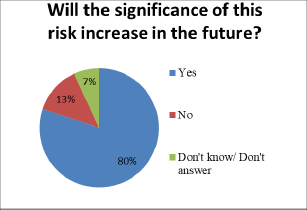doxa.comunicación | nº 31, pp. 19-39 | 35
July-December of 2020
Magdalena Mut Camacho
ISSN: 1696-019X / e-ISSN: 2386-3978
At this point, we can see that companies traditionally entrust the management of issues related to corporate reputation and communication to communications consultancy firms. At the present time, companies that offer Fact-checking or Artificial Intelligence services are not yet being used for managing risks related to disinformation and media manipulation.
7.7. The evolution of risk in the future
Source: Prepared by the author
For the reputational professional, this risk will be magnified both in itself and as a risk that may be linked to other risks that the company might be dealing with at the same time.
8. Conclusions and discussion
The results of this study confirm that reputation professionals believe there is a real threat from disinformation disseminated through social networks and the internet. They also believe we are facing a widely known and perilous problem, which they identify as a risk that is real, serious, and urgent. Moreover, this risk has been exacerbated by the current situation of the pandemic, which is full of uncertainty and doubt about the present and future. In fact, the perception of the professionals surveyed is in line with reports revealed by strategy consultancy firms for some years now. However, we have not found the same level of priority among the top management of the companies, as this reputational factor does not have the same exceptional nature and impact by comparison. However, 92% of the participants believe it is essential to measure and assess this risk, yet conversely, senior management does not see this option as a priority. Thus, only 32% of the companies have this type of evaluation in their risk architecture, and very few enterprises (21%) have this kind of assessment in one of their work programmes.
